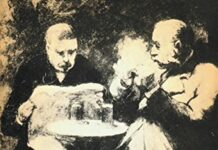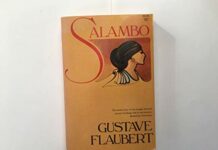
Ebook Info
- Published: 2005
- Number of pages: 368 pages
- Format: EPUB
- File Size: 0.38 MB
- Authors: Gustave Flaubert
Description
&&LDIV&&R&&LDIV&&R&&LI&&RMadame Bovary&&L/I&&R, by &&LB&&RGustave Flaubert&&L/B&&R, is part of the &&LI&&RBarnes & Noble Classics&&L/I&&R&&LI&&R &&L/I&&Rseries, which offers quality editions at affordable prices to the student and the general reader, including new scholarship, thoughtful design, and pages of carefully crafted extras. Here are some of the remarkable features of &&LI&&RBarnes & Noble Classics&&L/I&&R: &&LDIV&&RNew introductions commissioned from today’s top writers and scholars Biographies of the authors Chronologies of contemporary historical, biographical, and cultural events Footnotes and endnotes Selective discussions of imitations, parodies, poems, books, plays, paintings, operas, statuary, and films inspired by the work Comments by other famous authors Study questions to challenge the reader’s viewpoints and expectations Bibliographies for further reading Indices & Glossaries, when appropriateAll editions are beautifully designed and are printed to superior specifications; some include illustrations of historical interest. &&LI&&RBarnes & Noble Classics &&L/I&&Rpulls together a constellation of influences―biographical, historical, and literary―to enrich each reader’s understanding of these enduring works.&&L/DIV&&R&&L/DIV&&R&&L/DIV&&R&&LDIV&&R &&L/DIV&&R&&LDIV&&RThe publication in 1857 of &&LI&&RMadame Bovary&&L/I&&R, with its vivid depictions of sex and adultery, incited a backlash of immorality charges. The novel tells the story of Emma Bovary, a doctor’s wife bored and unfulfilled by marriage and motherhood. She embarks upon a series of affairs in search of passion and excitement, but is unable to achieve the splendid life for which she yearns. Instead, she finds herself trapped in a downward spiral that inexorably leads to ruin and self-destruction.&&LBR&&R&&LBR&&RAlong with Tolstoy’s &&LI&&RAnna Karenina&&L/I&&R, &&LB&&RFlaubert&&L/B&&R’s tragic novel stands as a brilliant portrayal of infidelity, an incisive psychological portrait of a woman torn between duty and desire. Written with acute attention to telling detail, &&LI&&RMadame Bovary&&L/I&&R not only exposes the emptiness of one woman’s bourgeois existence and failure to fill that void with fantasies, sex, and material objects. Emma’s thirst for life mirrors the universal human impulse for idealized fulfillment.&&L/DIV&&R&&LDIV&&R &&L/DIV&&R&&LDIV&&R&&LDIV&&R&&LB&&RChris Kraus&&L/B&&R is the author of the novels&&LI&&R I Love Dick, Aliens & Anorexia,&&L/I&&R and &&LI&&RTorpor,&&L/I&&R and a collection of essays, &&LI&&RVideo Green: Los Angeles Art and the Triumph of Nothingness.&&L/I&&R She is co-editor, with Sylvere Lotringer and Hedi El Kholti, of the independent press Semiotext(e). She teaches in the graduate program of the San Francisco Art Institute.&&LBR&&R&&L/DIV&&R&&L/DIV&&R
User’s Reviews
Editorial Reviews: About the Author Chris Kraus is the author of the novels I Love Dick, Aliens & Anorexia, and Torpor, and a collection of essays, Video Green: Los Angeles Art and the Triumph of Nothingness. She is co-editor, with Sylvere Lotringer and Hedi El Kholti, of the independent press Semiotext(e). She teaches in the graduate program of the San Francisco Art Institute. Excerpt. © Reprinted by permission. All rights reserved. From Chris Kraus’s Introduction to Madame BovaryFlaubert has often been credited as being the Father of Realism. Madame Bovary, his first and most classically plot-driven novel, has been labeled as “realist” because of—as many critics would have it—the author’s choice to depict “mediocre” and “vulgar” protagonists circling around a subject as “trite” as adultery. Like much criticism, these readings tell us a great deal more about the critics than the novel. Implicit in such statements are the assumptions (a) that there is anything “trite” about the conflict between human desire and the social demand for monogamy—which, as we will see, was applied selectively in Flaubert’s time to the lower reaches of the French middle class; and (b) that the author himself was immune to the trashy and fickle illusions embraced by his characters. Writing in 1964, critic and novelist Mary McCarthy describes Emma Bovary as “a very ordinary middle-class woman with banal expectations of life and an urge to dominate her surroundings. Her character is remarkable only for an unusual deficiency of human feeling” (“Foreword”; see “For Further Reading”). Sensing, perhaps, a need to distance herself from the proto-feminist implications of Emma’s dilemma, the brilliant, prolific McCarthy could only describe her as “trite.” Instead, she chooses to valorize Charles for his unfailing love of his wife—a love that is no less misguided and false than Emma’s romantic illusions. Except for the brief deathbed appearance of Dr. Lariviere, a man who “disdainful of honours, of titles, and of academies . . . generous, fatherly to the poor, and practising virtue without believing in it, . . . would almost have passed for a saint if the keenness of his intellect had not caused him to be feared as a demon” (p. 265), all of Flaubert’s characters are equally flawed and deluded. There is the rapacious, progressive pharmacist Homais and the dull-witted Charles, who loves his young wife for all the wrong reasons. Pleased with himself for possessing such a fine wife, Charles is so completely seduced by Emma’s well-rehearsed feminine wiles—her new way of making paper sconces for candles, the flounces she puts on her gowns, her little wine-red slippers with large knots of ribbon—that he cannot see her unhappiness. There is Emma herself, whose suffering never opens her eyes to the misfortunes of others. Her affairs, and her two lovers themselves, Rodolphe (the seducer) and Leon (the poet of adultery), prove to be equally untrustworthy and disappointing. There is Lheureux, the usurious loan-shark and salesman, and a large cast of pompous officials and idiot villagers. In a novel that is so technically modern and ground-breaking, it is interesting to note that Flaubert draws on the medieval slapstick tradition of naming his characters after their foibles: the Mayor Tuvache (“you cow,” in translation); the booster-ish technocrat Homais (“what man could be”: “homme,” the noun “man,” cast, like a verb, in the future conditional tense); and Lheureux, the purveyor of expensive false dreams, his name taken from the French word for “happiness.” Finally, it is the very idea that romantic love could be conducive to happiness that is most deeply discredited. When Rodolphe makes Emma fall in love with him at Yonville’s agricultural fair, it’s not exactly Rodolphe she falls in love with. When she is caught in his gaze, the little threads of gold in his eyes and the smell of pomade in his hair sets off a rapture of memories of all of the men she’s been in love with. Because she is in love with love, Rodolphe merely serves as a trigger, and at the time this is marvelous. But as the novel moves on, Emma behaves more and more like an addict. By part three, chapter six, when the novelty of her affair with Leon begins fading, Emma summons an imaginary Leon in a letter-writing delirium. “But while she wrote it was another man she saw, a phantom fashioned out of her most ardent memories, her finest reading, her strongest lusts, and at last he became so real, so tangible, that she palpitated wondering, without, however, the power to imagine him clearly, so lost was he, like a god, beneath the abundance of his attributes” (p. 241). After this free-basing binge, Emma “fell back exhausted.” These “transports of love” gave way to a “constant ache all over her.” (In Crack Wars: Literature, Addiction, Mania, philosopher Avital Ronell extrapolates from this metaphor with wild perfection.) “There is no goodness in this book,” wrote Charles-Augustin Sainte-Beuve, the most eminent critic of Flaubert’s time, in an otherwise favorable review of the novel. And yet the book breathes with compassion. Preparing to write the scene of Emma and Leon’s first meeting, Flaubert describes a strategy that informs the whole book in a letter he wrote in the early 1850s to his sometime-lover and literary confidante, Louise Colet: “My two characters . . . will talk about literature, about the sea, the mountains, music—all well-worn poetical subjects. It will be the first time in any book, I think, that the young hero and the younger heroine are made mock of, and yet the irony will in no way diminish the pathos, but rather intensify it” (The Selected Letters of Gustave Flaubert).
Reviews from Amazon users which were colected at the time this book was published on the website:
⭐I watch the movie lately from Madame Bovary and love it and this is why I want to have the book. Excellent story…
⭐I did not quite know what to expect, not having read any Flaubert before. I could feel the seething hatred for the societal values that prevailed at the time. All the characters are caricatures drawn from real people that Flaubert knew, yet he impressed his agenda on the plot. I enjoyed myself, and I see why this was a classic.
⭐Oh, good lord!. It is boring and i mean , boring to the point of not capable to understand what you are reading and you don’t care. Complex text, endless and non sense descriptions of the surroundings. Want to read some french authors? Try Alexander Dumas Perè and his son, Alexander Dumas Fils.
⭐I am starting to love the classics and funny enough i am realizing that they are far better written than modern day bores, i wish i could understand why the latest books are so unappealing to me!!! Read this book, its good.
⭐”Madame Bovary” is flawed in every way. The plot is one dimensional and not completely developed. Gustav Flaubert could not decide where he wanted to go with his plot – a risqué affair or how debt destroyed a family. With the shifting of the plots, I lost interest in the story, as I thought only the affair was the principal plot. The debt storyline felt like it was just thrown in, without a thought; I found it confusing and tedious. The writing was appalling, and I lost respect for Flaubert as a writer because of it. Such poor grammar and sentence structure! The characters were underdeveloped and lacked motivation. I had no idea why the characters were the way they were, and because of it, I didn’t care about them. Chapters were devoted to irrelevant narratives that did not further develop or advance any storyline or character. The entire story was much too long, and I could not see where it was going (even if I did predict the ending). Overall, this so-called “classic” needs to be retired, as it does not stand the test of time, and its author was horrible in his thought process. I do not recommend.
⭐
Keywords
Free Download Madame Bovary (Barnes & Noble Classics) in EPUB format
Madame Bovary (Barnes & Noble Classics) EPUB Free Download
Download Madame Bovary (Barnes & Noble Classics) 2005 EPUB Free
Madame Bovary (Barnes & Noble Classics) 2005 EPUB Free Download
Download Madame Bovary (Barnes & Noble Classics) EPUB
Free Download Ebook Madame Bovary (Barnes & Noble Classics)




